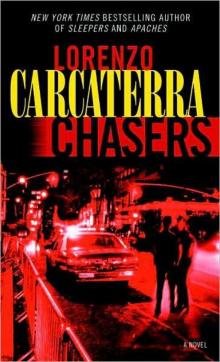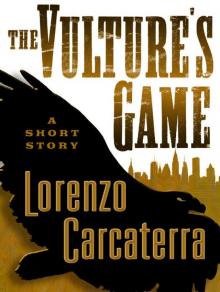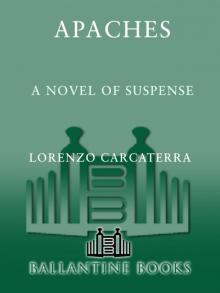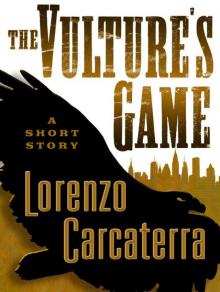- Home
- Lorenzo Carcaterra
The Wolf Page 5
The Wolf Read online
Page 5
“Close to two million Russians, we don’t know how many terrorists, and have even less of an idea of the number of Mexicans,” Carbone said, sitting rigidly in his chair, hands cupped around a glass of cold water. “That correct?”
“Pretty much,” I said.
“So I’m hoping—we’re all hoping—you have a plan to go along with your call to war,” Carbone said.
“And it can’t just be any plan,” Jannetti said. “It has got to be one terrific, kick-ass plan. Because I am not eager to get into the trenches with these bastards just to have my ass handed to me.”
“I have a plan,” I said. “It’s risky.”
“Which means what?” Orto asked.
“Which means it’s a great plan,” Qing said. “Only risky plans have any chance to be great.”
Chapter 6
Naples, Italy
Victorio Emanuele Jannetti walked down the center of a crowded street of Spaccanapoli, the very heart of Naples, beside his confidant of more than thirty years, Alfredo Lambretto. Three burly bodyguards walked several feet in front of them and two others followed close behind, all armed, eyes trained on the tourists and locals surrounding them.
“The kid’s instincts are correct,” Lambretto said.
He was a tall, thin man with a head of gray hair and a stylish beard. He had made it out of the hard streets of the most dangerous neighborhood in Italy—Forcella—and had the scars to prove it. He had risen from petty thief to become the Camorra’s main enforcer, commanding a group of over five hundred. “If we are going to move,” he continued, “now’s the time. These terror crews keep growing in number, and with Russian muscle at their backs it’s only going to get worse. Until now I’ve been able to push back and keep them out of our business. But each day passes, it gets harder and harder to do.”
“The all-out war Vincent has asked for comes with all-out risks,” Jannetti said. “We see this through to the end and we’ll be down by half, maybe more. And cash flow could become an issue if the fight lasts more than a few years. That may not be a concern to him, but it is to me.”
“We started with nothing in our pockets but a gun, you and me,” Lambretto said.
“We were a lot younger,” Jannetti said, “and with all to gain and nothing to lose. And these new guys don’t care about turf, running neighborhoods, bringing in cash. They just want to die, get to heaven and start the party.”
“Maybe they don’t care,” Lambretto said, “but the Russians and the Mexicans care. And getting to heaven is the last thing on their minds.”
Jannetti nodded. “I told Vincent to count us in,” he said. “Not that I had much choice. Not only are we part of the council, we’re part of the same family.”
“You want me to run the operation?” Lambretto asked.
Jannetti shook his head. “I want Angela to take the lead.”
“How you think she’ll feel working with Vincent?” Lambretto asked.
“She’s got Camorra blood in her veins, same as you and me,” Jannetti said. “Vincent fell into this life, but she was born to it. This fight will give her a chance to show the others on the council she belongs at that table. Not just sitting in my seat one day. But sitting at the very head of the table.”
Vittorio Jannetti was in charge of the Camorra, the Neapolitan branch of organized crime and one of the most vicious criminal outfits in the world. The group was established in the thirteenth century by a patriotic handful of citizens who decided they had seen enough abuse heaped onto the working poor by the powerful. They now number 3,500 members in Naples and New York, and are invested in the drug trade, fashion industry, construction, waste management, real estate, and the transport of toxic goods. They also control a wide portion of the European black market, which nets them $200 million per month.
Jannetti had entered the life as a boy, brought to the local Don when he was ten, a chronic truant with no patience for school. Jannetti lived in the heart of the Camorra power center and was delivered to them by his own out-of-work father. It was how the Camorra found their soldiers, taking boys from homes of men who owed them money or had nowhere to turn for help. They then raised the children as their own, placing each with a soldier’s family, putting the child through school. If the boy excelled at math, he went to business school; if his forte was science, he became a doctor. Over time, the Camorra would place thousands of their children in legitimate businesses.
Jannetti seemed always to be in the middle of a street fight. He had a flash temper and went after anyone he considered to be in his way. He had few friends but many silent enemies, and was feared by any who crossed his path. He was also a skilled organizational leader and a master planner. And those abilities were put to good use by the older members of the Camorra. They realized they could always groom someone to be a banker, lawyer, or doctor, but a crew boss was difficult to find and nurture, and Vittorio Jannetti was a natural.
He was sent to New York in his early twenties and partnered with Carlo Marelli. Together, the two wove a violent path through the city’s underworld, and by the time Jannetti was in his thirties, he and Marelli had risen through the ranks to control one of the five New York crime families. Jannetti had earned the respect of the Camorra power brokers and won a nickname that would follow him back to Naples, where he assumed control of his own men. He was called “the Cobra” because of the speed with which he attacked, launching an all-out assault when the enemy least expected, bringing a street war to an end when it had barely begun.
He had been married for a brief time to an American woman from Birmingham, Michigan, who bore him one child, a daughter who lived in the States and made her living as a teacher. He had little time for either woman beyond gifts on birthdays and holidays.
His true love was the daughter he had by a mistress who died in childbirth. Her name was Angela, and Jannetti raised her in the Camorra way, teaching her the practices and traditions she would need to uphold if she were to replace him as the Naples crime boss. She was every inch her father’s daughter and was known among the underworld as “the Strega,” the Italian word for witch. Angela had taken to the name so enthusiastically that she had mastered the centuries-old practices of those women.
“You ready to move?” Jannetti asked Lambretto.
“I put everything in motion while you were in New York,” Lambretto said. “Didn’t think the council would give Vincent a thumbs-down.”
“I gave him my vote, and we’ll stay in this so long as it helps and not hurts us,” Jannetti said. “Vincent lost his family so he’s going to go into this hard. And while I feel bad about what happened, that’s something he’s got to deal with. It’s his fight. Not ours.”
“You think the other crews feel the same as you do?” Lambretto asked.
“Not everybody’s heart is in it, “Jannetti said. “The Gypsy, Orto, will be the first to fold. The Japanese and Chinese, they’re all in, but who knows which way the French will go? The Greek will stick with us till the end. Still, Vincent can’t risk even one bad move. They’ll be on him in a flash.”
“If he screws up, then some of the blowback can do damage to Angela,” Lambretto said.
“Don’t worry about her,” Jannetti said. “She’ll know what to do.”
“When do we start?” Lambretto asked.
“Tonight,” Jannetti said. “Send a team into one of the Muslim sections and have them find three on our target list. Drag them out of apartments, bars, mosques, wherever they are.”
“Looking for information?”
Jannetti shook his head. “I don’t care what they know,” he said. “Throw them into the piazza and shoot them dead. Leave the bodies for their friends to find. That should get the ball moving.”
“You want me to clear any of this with Vincent?”
“We never have before,” Jannetti said. “Why start now?”
Chapter 7
New York City
I sat in the third row of an empty church, facing the main
altar, partly hidden by the shadows cast by candles that lit the faces of the saints and the Blessed Mother. I was not a religious man but I sometimes hungered for the serenity of an empty church. I never prayed; I never confessed. I sought nothing more than a few moments of reflection.
So I arrived early for my planned sit-down with Vladimir Kostolov.
It might appear out of place for me to agree to a meeting with Vladimir, especially one that doesn’t end with me taking him out. I had my reasons. First, there is the matter of respect. It’s as true now as it was back in the days when Luciano would sit across the table from Dutch Schultz in the middle of a bootleg war. The time to worry is when a boss doesn’t show at an agreed upon meeting. That’s when you know bullets will fly.
It was also a chance for me to fill in some of the blanks on what I could expect. Now, I have a stack of ledgers on Vladimir’s meetings with terrorists and the way he moves cash in their direction, but that only tells me so much. I need to sit across from a man, look him in the eye and get a sense of how deep he’s willing to go in the fight. You can’t get that out of a file folder. You get that by watching, listening not so much to what is said but what isn’t, what your opponent is willing to risk and where he will draw the line.
It was unlikely that Vladimir had funded the attack on the plane. On the surface, it didn’t seem a move he would make. There was little profit in it and the mayhem it caused was minimal. He would also need the approval of the Russian criminal federation to authorize an attack on a crime boss at my level, and no such meeting had taken place. If it had, word would have passed quickly through the criminal networks and I would have been made aware of it. Now Vladimir was never one to adhere to all the rules, but I had doubts whether he wanted to further risk the wrath of the Russian bosses this early in the game. Still, the loss of my family had sent me reeling, and despite my taking the controls and leading the charge into battle, I was not functioning at my best. That may have been the Russian’s intent, and even though it went against the way he had done business in the past, I couldn’t rule it out completely.
From his end, Vladimir was going to try to get just as much out of me. Our goals were the same—walk away knowing more than what we did coming into the meeting, while revealing little to the man on the other side of the pew.
By backing the terrorists, Vladimir had angered some of the older Russian crews. While they enjoyed the profits made off the chaos caused by any attacks, they felt it was in their best interests to keep their distance and let the bombers go about their business. Vladimir’s move put the Russian mob at the same table as the terrorists, a place some in the old guard wanted to steer clear of. That kind of anger leads to resentment and ultimately to bloodshed, especially now, when Vladimir’s actions put him at odds with the other organized crime syndicates. If he was feeling any heat from his own people, I could use that to my advantage.
“What is it with Italians and their churches?” Vladimir asked. “I have always wondered.”
“It’s our first stop and our last,” I said, staring straight ahead. “We open with a baptism and close with a funeral. A full circle.”
“Spoken like a believer,” Vladimir said, sliding into the pew, sitting to my left.
“It’s also a good place to meet, hear what a friend has on his mind,” I said.
“I know about the council meeting,” Vladimir said, gazing at the altar. “Your plan won’t work. The others will realize it before you do. But eventually you will come to the same conclusion.”
“I doubt that,” I said. “All these years, all those council meetings, we somehow never come to the same conclusion.”
“We are too big for you and the other gangs,” Vladimir said. “My men alone? Two million. The Mexicans? Another half million. And not even the terrorists can count the number they have. You won’t be able to sustain the losses.”
I turned to glance at him.
“I don’t want to kill everyone on your side,” I said. “Just those who need to die.”
Vladimir nodded. He shifted in the pew and turned his body toward me. “You know what everyone calls you, right? The Wolf?” he asked. “Do you mind it?”
“No,” I said.
“It is a name that suits your talents,” Vladimir said. “Track your opponents, get to know how they think, behave, maneuver. Once you have all the information you need … Except, of course, in your current situation. This time, even the mighty Wolf will be up against too many sheep to do them much damage.”
“What do you want?” I asked.
“I don’t want anything,” Vladimir said. “I came prepared to give. Twenty percent of profits, out of my end. You and the others won’t have to pull a trigger. Just sit back, let us do our work, and get a big check every month. How you choose to divide it, I’ll leave to you. You’ll be making money, no losses, no war you cannot win. Plus I guarantee one more thing.”
“What?”
“No harm will come to your son,” Vladimir said. “You have lost enough. No fight is worth losing all those we love.”
At the mention of my son’s name, something inside me shattered. I looked up at the altar, then stood and faced Vladimir. “I don’t want twenty percent. Or even that extra ten percent you would have thrown in if I had laughed at your offer. I don’t want any of it. I wasn’t looking to start a war. But I will be the one to finish it. That I promise.”
“Your partners may not share your zeal,” Vladimir said. “They should be told of the offer I made.”
“They’ve been told,” I said. “Your people reached out to them before our meeting was set.”
Vladimir smiled. “And had they agreed to my offer?”
“I would still be here,” I said. “Alone, if it came to that.”
I stared at Vladimir for a few seconds and then made my way out of the long pew and turned to leave the church. I stopped after a few steps. “You know what it is I most admire about a wolf?” I asked, my voice echoing off the walls of the empty church.
“Tell me,” Vladimir said.
“When he hunts his prey, he picks off the weakest first,” I said. “One by one. He leaves the strongest for the end, when it’s just the two of them, alone. And then he goes in for the kill.”
Vladimir looked entertained. “Does he always win?”
“No,” I told him. “But if he senses his pups are in danger, he will fight until his last breath.”
I stood there a moment, hands in my pockets. Then I turned, walked down the aisle and out of the church, back into the blaring sunlight of a warm and humid day.
Chapter 8
Rome, Italy
The luggage carousel at Rome’s Leonardo Da Vinci Airport began its slow circle around the cluster of passengers fresh off an Alitalia all-night flight from New York. The bags came out one at a time, watched over by a trio of airport personnel dressed in blue coveralls, one of them biting down on an unlit cigar. An American woman was trying to free a luggage cart from its slot while her husband shouted into a cell phone about a limo driver who was nowhere in sight.
Remi Frantoni stood to the side and watched the buildup to what he expected would eventually be full-blown chaos. He was careful not to lose sight of the attractive redhead in tight jeans and designer jacket, large backpack resting against the side of her left leg.
She was his target.
Remi was twenty-seven, six feet tall, and fit. He wore cream-colored cargo pants, a thin leather jacket, and brown desert boots. He had two guns, both nine millimeters, nestled in holsters tucked under his jacket. He glanced at his watch.
There were seven minutes left.
Frantoni was the youngest member of Italy’s antiterrorism unit, a group first formed in the 1970s when the country endured its own lengthy battle with homegrown terrorists, the Red Brigade among them. In that bloody decade, the terror outfits turned the streets, highways, and airports of Italy into avenues of slaughter.
Frantoni spoke four languages, was adept at wea
pons and tactics, and had a slew of street connections supplying information to keep him a step ahead of terror activity headed his way. He could break down the command structure of any known terrorist group working his corner of the globe, analyzing their mission and motives, helping narrow the target base.
But what Frantoni was most skilled at was spotting the face in the crowd, the one primed to do the most damage. It could be the elderly woman to his left navigating a carry-on with a handle that wouldn’t budge. Or it could be the businessman under the large clock, the one in the wrinkled suit holding a leather satchel, initials emblazoned in the center. Or it could be the middle-age priest leaning against a pole, hands in his pockets, black shirt one size too large for his slender frame.
But it wasn’t any of them.
It was the redhead in the tight jeans.
Her body language was good, a little too good, giving off an air of indifference to the long wait for luggage, making a show that she wasn’t in a rush to get anywhere. The backpack also was a tip-off. Not the fact that she had one, since practically anyone under the age of twenty-five getting off a plane had one. It was the way she carried it—or tried to. She made two attempts to get it on her back and each time found it too cumbersome a task to manage, resting it against her leg, always with the pocket side facing in. The backpack was not stuffed to the gills like those carried by others in her age group. Young adults treat them as suitcases and jam in as much as weight regulations allow. Instead, hers was thin and clean, as if it had been purchased the day of the flight. The redhead also gave off the look of privilege: she was clearly someone accustomed to having her bags, light or heavy, carried by other hands. And then, of course, there were the shoes.
A young woman of her background and breeding would have topped off the designer jacket and form-fitting jeans with a pair of fashionably expensive flats, or maybe a new pair of Nikes. She even might have gone with flip-flops, if she were seeking convenience. But it would be unlikely for her to choose a pair of Timberland boots.

 Tin Badges
Tin Badges Gangster
Gangster Paradise City
Paradise City Chasers
Chasers The Vulture's Game
The Vulture's Game Payback
Payback Apaches
Apaches Sleepers
Sleepers The Wolf
The Wolf Street Boys
Street Boys The Wolf: A Novel
The Wolf: A Novel The Vulture's Game (Short Story)
The Vulture's Game (Short Story)